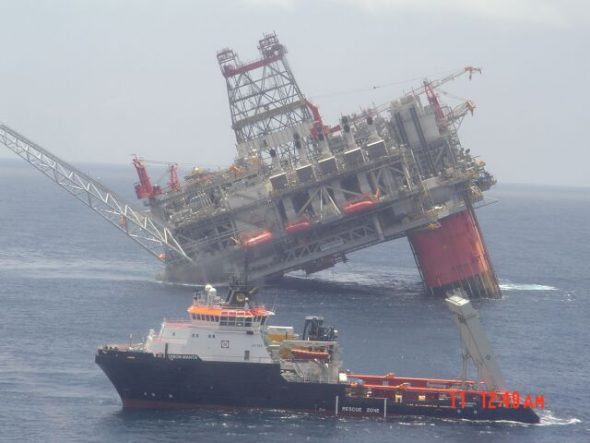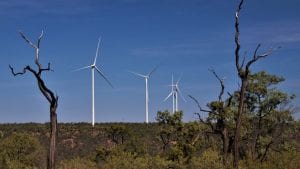Fossil fuel companies should be factoring in the risk of a climate change-driven ‘black swan event’ – such as the sudden and complete transformation of the global energy market, or a decision to cap global emissions – as part of their basic business strategy, a new report has found.
The enormity of the “carbon risks” faced by fossil fuel companies – and the lack of an adequate response to those risks – has again been highlighted this week, with the publication of a blueprint for testing companies’ resilience to climate change and the many changes it will bring.
The roadmap, jointly published on Thursday by the Carbon Tracker Initiative and Energy Transition Advisors, is based on the core belief that company management has a duty to shareholders to assess all factors that may pose a risk to the business.
It argues that climate change – or more specifically, the global effort to meet a carbon budget that will limit warming to 2°C above pre-industrial levels – should be treated no differently from other industry risks, like safety, cost overruns and project delays.

“Most businesses, including fossil fuel companies, have business models that can cope with minor movements in external variables, such as prices and costs,” says the report.
“However, coping with events that the industry might classify as so-called ‘black swans’ such as a sudden move to cap global emissions is harder and pre-planning for such events seems sensible to Carbon Tracker.”
Sensible, indeed, considering the mounting number of reports coming from the world’s leading financial organisations, including HSBC this week, to warn that the tightening global carbon budget risks rendering fossil fuel companies, or at least their major assets, “non-viable.”
“What our blueprint advances is a risk management process that tests for what could be seen as an ‘orderly’ energy transition and considers a ‘disorderly’ one where change is abrupt, a so-called ‘black swan’ event, that tests business models to the limit, potentially destroying shareholder value in the process,” said Carbon Tracker research advisor Mark Fulton, a co-author of the report with 35 years’ experience in financial markets
But for an industry that Carbon Tracker says has “a history of failing to assess risk,” the report notes that such 2°C-driven scenarios as a global cap on emissions are still considered unlikely by many of the world’s biggest fossil fuel companies.
Companies like Exxon Mobil, for example, have disclosed business forecasts that are still not yet aligned with even the IEA’s New Policy Scenario (NPS) on demand – an outlook that is less constrained than its 2°C scenario.
“It is very important, in Carbon Tracker’s view, that management assesses the potential impact of these scenarios, especially if it regards them as ‘unlikely’,” says the report.
“After all, ‘unlikely’ scenarios (such as the halving of the oil price in twelve months) can have a material impact on value.”
Carbon Tracker’s current assessment of the fossil fuel industry is that senior management is still “overly focused” on demand and price scenarios that assume business as usual.
“As such, there may be a risk assessment ‘gap’ between a management’s view of the future and that resulting from action on climate change, technological advances and changing economic assumptions,” said Paul Spedding, an advisor to Carbon Tracker and co-author of the blueprint.
Critically, according to Spedding – a former global co-head of oil and gas research at HSBC – the greatest impact will, initially, not come from reduced demand for fossil fuels, but from pressure on commodity prices caused by lower-than anticipated demand.
For this reason, Carbon Tracker recommends fossil fuel companies carry out a thorough risk assessment on the implications of an energy transition (see table below) including demand and price pathways that differ from the status quo.
It says relevant stress-tests include key indicators for the future project portfolios such as Internal Rates of Return and breakeven price curves; indications of cash flow and revenue at risk from commodity price changes and the flexibility built into a company’s committed and uncommitted five-year capital investment program.

One of the paper’s central findings is that companies need to exercise “capital discipline” – that is, to limit their exposure to high-risk projects that require huge financial investment with little guarantee of a return on that investment at the other end.
A good example of this can be seen in the proposed expansion of Australia’s Abbot Point coal port, to accommodate exports out of a series of mega coal mines proposed in Queensland’s Galilee Basin.
As well its high level of exposure to environmental, social and governance risks – that is, its threat to the World Heritage-listed Great Barrier Reef, and links with waste disposal and carbon pollution that gained it the title of world’s 3rd most controversial project for 2014 – it is a huge economic risk, being tied to a market that is in serious decline.
“Companies must ensure they follow both a top-down and bottom-up approach to addressing risks,” said Robert Schuwerk, senior counsel to Carbon Tracker who is responsible for US regulatory and legal analysis.
“It’s the interaction of these governance and business processes in relation to the energy transition that is crucial to our blueprint.”










